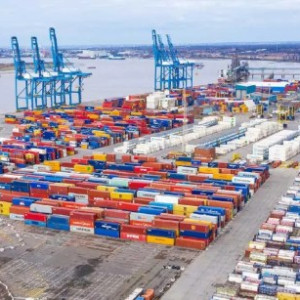Thames Freeport Gears for Large-scale Private 5G Networks

Thames Freeport is set for a multi-year, multi-billion-dollar operational transformation and economic revival for the region. The world-class industrial cluster, which is strategically positioned along the River Thames in London, announced a strategic partnership with Nokia and Verizon Business to deploy Private 5G Networks across multiple key logistics, manufacturing, and innovation sites. The Private 5G Networks buildout provides a scalable, long-term connectivity foundation for advanced data, AI, edge compute, and IoT infrastructure deployments aimed at transforming port and manufacturing operations.
The technological enhancements will play a direct role in boosting the local economy, underpinning job training and reskilling efforts as part of employment initiatives and supporting innovation and research, and development collaborations among Freeport tenants and outside corporate, government, and research entities. Verizon Private 5G Networks will enable advanced data and application capabilities for AI-driven data analytics, predictive maintenance, process automation, autonomous vehicle control, safety monitoring, and real-time logistics orchestration. Moreover, Nokia is the sole hardware and software provider for the networks.
It will incorporate the Nokia Digital Automation Cloud (DAC) platform and Nokia MX Industrial Edge (MXIE). Technologically Advanced Commercial Corridor Jennifer Artley, SVP, 5G Acceleration, Verizon Business, said their partnership with Thames Freeport and Nokia shows the full promise of private 5G at scale. "Thames Freeport is developing one of the most technologically advanced commercial corridors in Europe to enable forward innovation and economic revitalization for an entire community.
We're not just driving operational improvements to help a partner stay ahead of the curve; we are laying the groundwork for new revenue streams, community development, and further commercial and technological investment." Martin Whiteley, CEO Thames Freeport, said a flexible, high-performance connectivity platform is critical to their long-term vision. "Our investment in private 5G is not an incremental network upgrade, it's the backbone of a technological transformation fuelling our long-term multi-stakeholder mission, which includes operational excellence for tenants; ROI for shareholders like Ford, DP World and Forth Ports; innovative leadership for public and private benefit; circular economy models supporting efficient energy models; empowering community development by enabling high-value job creation and training; transforming public services with near real-time diagnostics at health-service sites." He highlighted that by partnering with Verizon Business and Nokia, Thames Freeport is delivering the technology needed to propel the region to the forefront of the leading edge. David de Lancellotti, VP of Enterprise Campus Edge Sales, Nokia, said private wireless and industrial edge are the foundation for the digital transformation of industrial sites.
He believes the Thames Freeport deployment is a landmark example of this evolution at scale. "This is one of the largest commercial private 5G rollouts in a European port, incorporating the Nokia DAC platform. This network will allow Thames Freeport to overlay advanced use cases such as AI-driven analytics, predictive maintenance, process automation, autonomous vehicle control, safety monitoring, and real-time logistics orchestration." De Lancellotti added that they are excited to be enabling the infrastructure with Verizon Business to help Thames Freeport drive new efficiencies, sustainable growth, and long-term economic opportunity for the region.
5G Networks Will Strengthen Thames Freeport The Thames Freeport has a mission of economic regeneration and operational excellence, centered on stimulating trade, fostering innovation, supporting energy transition, creating jobs, and improving the lives of the people around it. Private 5G Networks from Verizon Business can help enable a range of strategic priorities at Thames Freeport sites in service of that mission.
Verizon Private 5G Networks will be deployed to:
- DP World London Gateway and DP World Logistics Park - the UK's largest and most integrated deep-sea container port and logistics facility, with port capacity to handle over 3 million units per year. The hub includes a rail terminal with 20 daily services and a 9.25 million square foot high-tech logistics center.
- Port of Tilbury, (two sites) - this is the largest of the mixed-use Thames Freeport ports. Tilbury handles 16 million tonnes of cargo per year across 31 independent working terminals.
Operated by Forth Ports, the sites comprise a crucial logistics hub for the construction, automotive, and food & drink sectors.
- Ford Dagenham - this is the largest manufacturing site in London, a unique location that gives access to regional manufacturing clusters, proximity to suppliers, and brings key production closer to the end market.
Select priorities include enabling advanced technology layers such as AI, edge computing, and IoT across active industrial sites where Freeport stakeholders can collaborate on new applications. For example, industrial sites can leverage IoT for autonomous yard tractors and quay cranes and for near real-time tracking, smart routing, and condition monitoring for cargo. That can allow tenants to intake cargo, assess quantity and condition, and ship it out faster and more efficiently, losing less to damage or misplacement.
Additionally, AI with edge computing can help manage environmental impact through edge-connected smart sensors and AI-driven analytics that monitor and optimize port operations and asset performance, including near-real-time monitoring of emissions, air and water quality, and noise levels.
Managing the use of the Verizon Private 5G Network infrastructure will be the responsibility of Thames Freeport and its tenant shareholder organizations.
This ensures fit-for-purpose connectivity that adapts to site-specific requirements while safeguarding data and operational autonomy.
